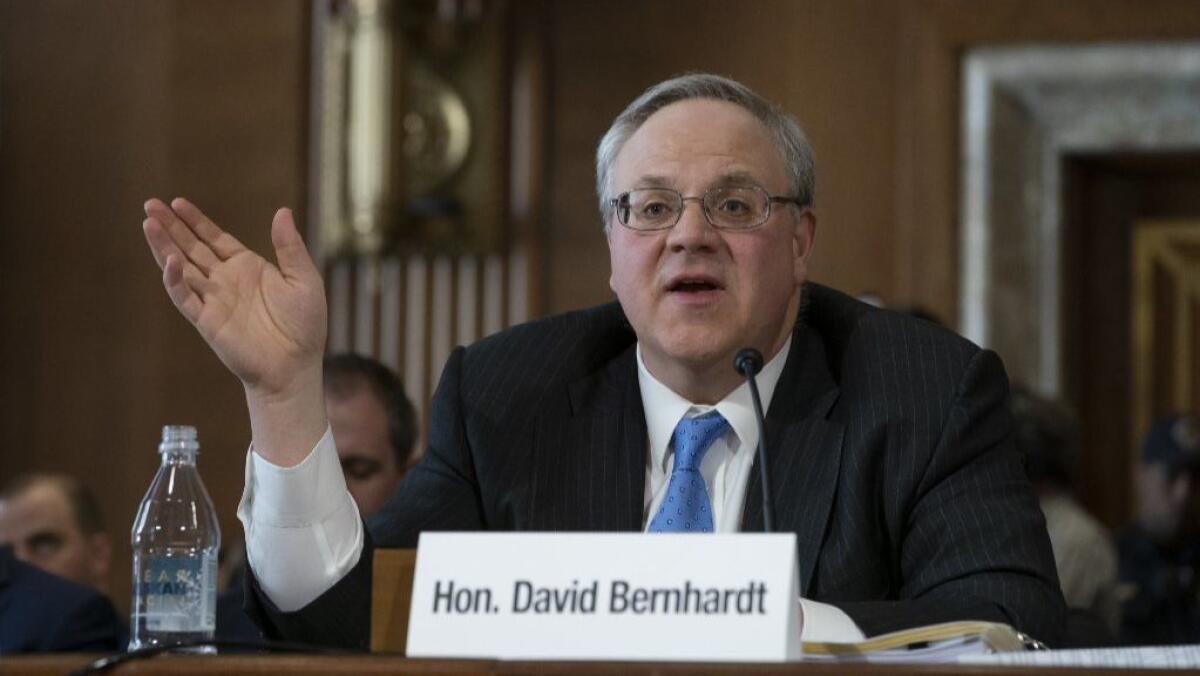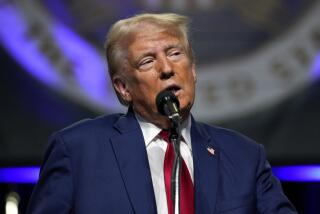David Bernhardt confirmed as Interior secretary despite ethics concerns

Reporting from Washington — David Bernhardt, President Trump’s pick to the lead the Interior Department, was confirmed by the Senate on Thursday amid persistent ethical concerns and doubts about his independence from the energy and water industry groups he long represented as a lobbyist.
Senators voted 56-41 in favor of Bernhardt’s confirmation. Several Democrats crossed party lines to support the nominee, including Sens. Joe Manchin of West Virginia, Kyrsten Sinema of Arizona and Martin Heinrich of New Mexico.Sen. Angus King of Maine, an independent who caucuses with the Democrats, also voted for confirmation.
Before becoming acting secretary, Bernhardt spent about eight years as a partner in Brownstein Hyatt Farber Schreck, one of the nation’s top-grossing law and lobbying firms, according to public rankings. There he represented energy, mining and Western water interests that deal with the Interior Department, including two California entities, Westlands Water District — the nation’s largest irrigation district — and Cadiz Inc.
Bernhardt’s firm sued the department four times on Westlands’ behalf. He personally argued one appeals case challenging federal endangered species protections for imperiled salmon. He did legal work for Cadiz, which wants to build a water pipeline on a railroad right of way that crosses federal land in the California desert.
When Bernhardt was confirmed as deputy secretary in 2017, he had to sign the administration’s ethics pledge and recuse himself from participating in “particular matters” involving more than two dozen former clients. Some of the recusals were effective for two years, others for one. In the last year, he has helped put policies in place that benefit businesses he once represented as a lobbyist.
Last year, for example, Bernhardt helped craft a Trump directive that would especially benefit Westlands. The directive ordered federal agencies to devise plans to suspend or revise regulations that hamper water deliveries to Central Valley agriculture. An Interior Department spokeswoman said the Westlands recusal had expired by the time Bernhardt took that action.
Bernhardt has won praise from Republicans for opening millions of acres of public land to oil and gas leasing. But Democrats, environmental advocates and some outside ethics watchdogs say his record makes him one of the administration’s most conflict-riddled Cabinet nominees.
Rep. Jared Huffman (D-San Rafael) called Bernhardt “a poster child for the corruption of the Trump administration.” Sen. Ron Wyden (D-Ore.) has accused Bernhardt of lying and asked the U.S. attorney for the District of Columbia this week to investigate whether Bernhardt broke the law by lobbying for a client after he claimed to have stopped.
On Wednesday, 50 House Democrats signed a letter asking senators to oppose Bernhardt’s nomination on the grounds that his conflicts of interest and support for regulatory rollbacks should be disqualifying.
So far, Republicans have mostly shrugged off the complaints. Compared with former Interior Secretary Ryan Zinke, who faced ethics investigations into his travel spending and business dealings, Bernhardt’s behavior in office has been less conspicuous.
But to critics of lobbyists’ influence in Washington, it is no less alarming.
“The corruption we saw from the others has been a stumbling, bumbling type of shilling for private industries,” said Huffman, who has sponsored a bill to tighten regulations on former lobbyists. “With David Bernhardt, it’s been refined to a high art. He personifies this revolving-door corruption problem.”
Citing reporting by the New York Times and a 2017 Los Angeles Times article detailing Bernhardt’s previous lobbying activities on behalf of Westlands, Democratic Sens. Elizabeth Warren of Massachusetts and Richard Blumenthal of Connecticut asked the Interior Department’s ethics office in February whether Bernhardt had violated ethics standards when he participated in jump-starting a review of Endangered Species Act protections for fish.
In a recent reply, ethics official Scott de la Vega said Bernhardt had not broken ethics rules because revisions of endangered species protections were much broader than “particular matters,” which would include litigation or settlement agreements.
De la Vega’s interpretation of the ethics restrictions and the August expiration of remaining recusals suggest that as secretary Bernhardt would have considerable leeway in shaping Interior Department policies that would benefit his former lobbying clients.
Outside advocacy groups that have raised concerns about Bernhardt said they have been ignored or had their complaints rejected.
In 2017, the liberal group Campaign for Accountability filed a complaint with the Department of Justice, asking for an investigation into whether Bernhardt had violated the Lobbying Disclosure Act by continuing to work on behalf of Westlands, despite having formally ended his lobbying activity. According to the group’s executive director, Daniel Stevens, it never got a response.
Bernhardt could not have been appointed to an Interior Department post under the Obama administration’s ethics pledge, which barred registered lobbyists from taking jobs with an agency they had lobbied within the last two years.
Trump dropped that ban, and his administration’s ethics enforcement is not as strict as past administrations, according to legal experts.
“I think the Obama administration was more conservative in their interpretation of the ethics pledge,” said Richard Painter, a University of Minnesota law professor who served as President George W. Bush’s chief ethics lawyer. “And the Obama administration didn’t have as many people coming in from the private sector.”
Sally Jewell, who served as Interior secretary during President Obama’s second term, said in an interview that she took the revolving-door lobbyist ban so seriously that she wouldn’t hire a job prospect who wasn’t a registered lobbyist but “had done a lot of work and influence on Capitol Hill. … I said, ‘I can’t. It’s too close.’”
“It does feel like we worked very hard to play by the rules,” she said. “And we’re now at a time where people are looking sort of technically at the words and not necessarily the spirit of the ethics laws.”
More to Read
Get the L.A. Times Politics newsletter
Deeply reported insights into legislation, politics and policy from Sacramento, Washington and beyond. In your inbox three times per week.
You may occasionally receive promotional content from the Los Angeles Times.












